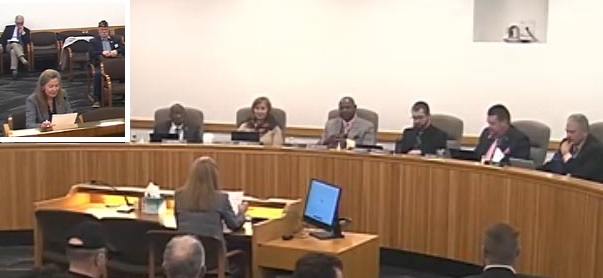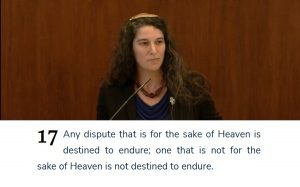‘Defend the Guard’ bill would force Congress to follow the Constitution
14 min read
Testimony edited for brevity and clarity.
Presenter: Senate Bill 667 would require a Congressional declaration under Article I, Section 8 of the U.S. Constitution, before sending Oregon’s National Guard into war or armed conflict. The bill would require Congress to declare war under Clause 11, or to explicitly call forth the Oregon Guard under Clause 15. During the public hearing Feb. 27, Sen. Diane Linthicum:
[00:00:26] Sen. Diane Linthicum: SB 667 is known as the ‘Defend the Guard’ bill. This legislation would prohibit the deployment of Oregon’s National Guard units into active combat without a formal declaration of war by Congress, as required by Article I, Section 8 of the U.S. Constitution.
[00:00:43] This ‘Defend the Guard’ bill emphasizes the importance of congressional approval before committing our young people to the trauma of foreign wars. The federal government has ignored this constitutional requirement for decades to the detriment of our service members.
[00:01:00] Presenter: Sen. Kim Thatcher:
[00:01:02] Sen. Kim Thatcher: The need for this bill arises from the fact that Congress has not carried—they have not carried out their constitutional duty since World War II. And that has led to, arguably, illegal deployments, overseas deaths, and endless wars.
[00:01:21] Currently the Oregon National Guard is deployed to at least three war zones in the Middle East. Last year our bases in Iraq and Syria came under attack more than 170 times. Of course, there’s a lot of death and injury associated with that and that includes our Guard members.
[00:01:37] The National Guard has multiple tasks, including helping state forces during natural disasters. In 2020, when we needed our guardsmen to assist in the Columbia Gorge wildfire, their equipment was deployed thousands of miles away and not around to help with the state disaster. So the protection of the lives of our guardsmen and women must be the priority and is our responsibility as a legislature.
[00:02:00] The Founding Fathers were very cautious about giving the executive branch the ability to initiate wars, in order to prevent any abuse. That’s why the Constitution explicitly authorized the Congress only to declare war.
[00:02:14] Presenter: Rep. Alek Skarlatos:
[00:02:16] Alek Skarlatos (House District 4): My name is Alek Skarlatos. I represent House District 4 and I was in the National Guard for five years, did the Afghanistan deployment in 2014, 2015. And I just wanted to say on this bill: The National Guard is primarily meant to stay at home in Oregon. We are meant to defend the nation and to assist our state with natural disasters and anything else that they need.
[00:02:43] Ever since President (George W.) Bush federalized the National Guard following 9/11, we have been deployed overseas with increasing frequency, more so even than active-duty units. And if the active-duty military needs more troops, then they should recruit more. They shouldn’t use the National Guard as a supplement. It’s just being abused at this point.
[00:03:05] Again, Bush activated the National Guard after 9/11 following an attack on New York City. That was, I don’t, I can’t even do the math, 24 years ago now? And the National Guard is still federalized and deployed.
[00:03:20] I just came here from my emergency management committee and we always talk about the Cascadia Subduction Zone event and its threat to the state of Oregon. And like Sen. Thatcher mentioned, our troops are currently deployed to Egypt and other places around the Middle East. If that were to happen right now today, we would have almost no National Guard inside the state of Oregon to assist with that emergency.
[00:03:48] And not to mention, our troops deployed to Egypt were deployed without medical supplies—personal IFAKs—which is, I think, personally very offensive, considering that we’re lending our citizens, our soldiers, our troops to the federal government, and when the state doesn’t have ample supplies, which I think they should, the federal government still doesn’t even take the opportunity to step up and give our troops the supplies that they need when they’re deployed on behalf of the federal government.
[00:04:23] For all of those reasons, I would urge you to support this bill and I would be happy to carry it in the House.
[00:04:29] Dan Handelman: My name is Dan Handelman. I use he/him pronouns and I’m with the group Peace and Justice Works. We believe the Guard should only be deployed overseas when there’s a congressional declaration of war as required by the Constitution and this bill.
Late last year, Oregon’s Guard was sent to Iraq where the authorization for use of military force passed in 2002 was to engage in military action against the deposed government of Saddam Hussein. And Syria, a country whose government has also been deposed but to which Congress never issued an authorization for war.
[00:05:00] We are concerned, however, about the inclusion of proposed Clause 2B, outlining other constitutionally authorized reasons to deploy the Guard. While Congress might ask Oregonians to head to the Mexican border because migration has been referred to as an invasion, that’s not an appropriate use of the military. The Constitution envisions people who are trying to come into the country and conquer territory on behalf of a foreign power, not those fleeing oppression or poverty and seeking better lives.
[00:05:23] Similarly, there are references to people who took to the streets for racial justice in Portland as a rebellion. But again, they were not seeking to overthrow the government. Remember, it was members of the National Guard who took the lives of people protesting the Vietnam War at Kent State University in 1970.
[00:05:39] If the clause must remain, it might say ‘takes official lawful action as authorized by Article I, Section 8, Clause 15 of the United States Constitution.’ That’s the approach taken in a Guard home bill currently in the Maine legislature.
[00:05:53] Annie Kallen: My name is Annie Kallen and I live in Portland. I am the chair of the Libertarian Party of Multnomah County, and we’ve made a resolution in support of this bill, SB 667, ‘Defend the Guard.’
[00:06:06] The United States Congress abnegated its responsibilities in 2001 when they passed a vague and general authorization for use of military force. And that granted then-President Bush broad abilities to conduct military action after Sept. 11.
[00:06:22] We believe that the authors of the Constitution of the United States recognized the importance of the state’s sovereign authority over the militia to remain outside the chain of command of armies raised by the United States. This is an essential check and balance on military tyranny.
[00:06:39] The Oregon Guard has been sorely needed at home to help prevent, control things like natural disasters and defending the freedoms, privileges, and immunities of the citizens of this state.
[00:06:50] More specifically, in 2020, there were six Oregon Guard Chinook helicopters that were sent to a mission in Afghanistan. And this is a time when, you know, fires were raging all over Oregon. And if they had been here, they could have helped to put out those fires.
In 2024, the Oregon National Guard 2nd Battalion 218th Field Artillery Regiment was mobilized as part of the Task Force Defender in the Middle East. And this was not authorized by the U.S. Congress as an act of war.
[00:07:21] And just to speak personally, in my own—for my own feelings, I was in my early 20s when George W. Bush said that the war in Iraq would be swift, and we would secure a certain victory in a very short period of time. And I’m now in my mid-40s, and we are still embroiled in a collection of related wars that have never stopped. So this harms the people in those countries and it also harms the servicemen and women who are sent there.
[00:07:49] Marrion Kaufman: My name is Marrion Kaufman. The decision to deploy our state’s Guard to foreign combat zones is a very serious matter. Not only does this put the lives of Oregonian troops at risk but it also depletes the resources available for responding at home, as others have mentioned, including that for disasters such as earthquakes and wildland fires.
[00:08:10] Due to the gravity of such a decision, this power is limited by the constitutional requirement that Congress must first deliberate over the merits of an official war declaration. Senate Bill 667 simply requires that our elected representatives act responsibly and carefully in the matter of foreign combat deployments. It has no effect on deployments relating to disaster response or training missions, even overseas training missions, despite what opposition testimony may imply.
[00:08:39] Marvin Sandnes: I’m Marvin Sandnes. I want to encourage you to vote favorably on this so this issue needs a wider discussion and voting this favorably would provide a wider discussion for this issue.
[00:08:53] Julie Bivens: I’m Julie Bivens. And I’m here to voice my support for this bill. I think that it’s really kind of an un—should be unnecessary because the Constitution spells out quite clearly how our National Guard should be used.
[00:09:09] Like other people have mentioned, our 2020 fires that raged through Oregon. We had no National Guard to help. The helicopters were in the Middle East. And I think even the recent disaster in North Carolina should point out why Oregon should do things the way they are written. Because two days after that disaster happened, they sent their National Guard to Syria. And these things are not how the Guard is meant to be used.
[00:09:42] Anna Munson: My name is Anna Munson, and I’m here in support of SB 667. I want to bring a different perspective. I’m the wife of 100% disabled Vietnam vet. We have been married 40 years, and I want you to know that when anyone is in a combat zone, the consequences of that tour may not be visible for many years, but they do eventually show up.
[00:10:05] This bill requires that Oregon Guard troops are sent to areas that are considered combat zones. It requires a declaration of war from our Congress. I want you to know that when these men and women come back, the long-term conditions that deployment has ramifications, not only to the veteran, but to their families, immediate and extended. For me, my husband has multiple heart conditions and procedures. He is an insulin-dependent diabetic with high blood pressure and comorbidities and now uses a scooter for mobility, all complications of Agent Orange.
[00:10:49] We send our troops to war-torn countries, we expose them to a large variety of risks, risks that become real later. I ask you to remember, and our leaders to remember, what happens to them not only affects the individual soldier, but also their loved ones. I and my family support my husband and are proud he served his country, and community. Asking the United States Congress to make a declaration of war before we send the militia of this state to support an armed conflict is what our forefathers codified in the Constitution.
[00:11:27] But I ask that you support not because it is a law, but because we need to remember that we’re sending our sons, daughters, husbands, wives, fathers, mothers, aunts, uncles, cousins, friends, and more. These are people, real people, who have chosen to serve in Oregon’s National Guard. We are sending them to dangerous situations that will affect them and all those around them.
[00:11:56] To know that our leaders have considered and taken official action on the conflict is not too much to ask.
[00:12:05] Chuck Fall (Green Liberty Caucus): My name is Chuck Fall and I’m from the Green Liberty Caucus. And we support passage of ‘Defend the Guard’ Senate Bill 667. As a matter of principle the Green Party is opposed to militarism. We support peace and we oppose American hegemony abroad and we seek to reform the national security state agencies.
[00:12:28] The U.S. Constitution enshrines the power to declare war only to Congress, and Senate Bill 667 would prevent the Oregon National Guard from being deployed when war has not formally been declared.
[00:12:41] Congress has not declared war since World War II, but has since authorized the President to send troops overseas in the name of national security. This is unconstitutional on the simple grounds that a military operation that looks like a war, acts like a war, and functions like a war is a matter for Congress to declare.
[00:13:01] If Congress wants Oregon National Guard troops to be deployed overseas in a military action, then Congress needs to do what the Constitution says to do: Formally declare war, otherwise the Guard should stay home. Since Sept. 11, 2001, the United States has dedicated 20+ years of undeclared war in Afghanistan and Iraq and Libya, Syria, and other places as a way of establishing American hegemony.
[00:13:27] This has been conducted on the backs of the state National Guard. Senate Bill 667 ‘Defend the Guard’ would prevent Oregon troops from being used to advance unjust wars. It would protect Oregonians from being used as fodder in wars of aggression that only benefit the plutocratic power structure, the power elite, to use the term from C. Wright Mills.
[00:13:49] President Eisenhower warned the nation about the military-industrial complex. Sadly, Congress has done nothing to counter the influence, and so now today it is left to Oregon legislators to set the record straight that the Oregon National Guard will not be played as a pawn in American national security operations abroad.
[00:14:13] Dr. Rick Staggenborg: Dr. Rick Staggenborg, I’m here to testify in support of (SB) 667. I’m a veteran. I am a retired VA psychiatrist and I took an oath to defend the Constitution against all enemies, foreign and domestic. I took that oath and it doesn’t have an expiration date.
The Constitution is under threat every time we send troops into combat without a declaration of war, be they National Guard or otherwise. And as has been pointed out repeatedly, we’re doing it constantly. This is a direct threat to the Constitution and to democracy itself, as Madison warned.
[00:14:56] This is why it was put into the hands of Congress, who is supposed to debate these things, and it hasn’t debated. Well, if you’re in the military, you’re expected to not obey illegal orders. This is a very clear example of a violation of the Constitution that we all have a duty to uphold.
[00:15:19] And I can also vouch, in my experience, personally as well as a VA psychiatrist, about the consequences of war to people who serve.
[00:15:33] And I don’t think that we should be sending our sons and daughters into combat on the say-so of politicians who may not be motivated by the best interests of the United States. National interests are not simply defined as the interests of the international corporations that can afford to pay for the election of our national officials. We have to assert our own personal authority, as well as our legal authority to refuse illegal orders.
[00:16:12] Dan Pulju: My name is Dan Pulju. I was the Pacific Green Party candidate for U.S. Senate in 2022 and I’m a co-director of Anti-War Oregon. I’m going to say something a bit different than has been said so far with a bit of statistics.
[00:16:25] According to a report by Amy Belasco of the Congressional Research Service: At their peak in 2008, fully 26% of active-duty U.S. Army personnel were deployed in Operations Iraqi Freedom and Enduring Freedom in Afghanistan. And when considering units either training up for or recovering from deployments this number, the number affected by these operations was about double the number currently deployed. That would mean about half, leaving only half of the active-duty army available to focus on defense of our homeland itself.
[00:17:02] Now this context lets us understand why fully 11% of personnel deployed in 2008 to these two operations were from either Army or Air National Guard units. The Pentagon had bit off more than it could chew and it brought in reserves and territorial defense units to compensate. Was that advisable?
[00:17:24] I think most Americans now agree much later that we have gained little or nothing from these wars. Afghanistan is once again controlled by the so-called Taliban. Iraq suffered chronic insurgencies over many years by al-Qaeda and Islamic State, and now Syria is controlled by an al-Qaeda-derivative militia. Knowing this result, we should reevaluate whether it was worth the risk.
[00:17:50] Now, when Congress authorized these operations, did it fully consider the long-term consequences, including the likelihood of overextending the military at the expense of homeland defense? I believe that it did not. It was more interested in politics.
[00:18:06] Congress avoids formal declarations of war to evade its own due diligence and accountability. I believe that for the security of our nation, we must make Congress duly diligent and accountable. Requiring a formal declaration will help us do that.
[00:18:22] We have come to the realization that the federal government has been acting unlawfully. So to me what this is about is the states standing up and telling the federal government that they will resist, that we will resist them taking these unlawful actions.
[00:18:37] Ibra Taher: My name is Ibra Taher. Our guardsmen are being deployed unconstitutionally, continuously, towards we don’t know what their mission is. Ill-defined mission, unconstitutional practices—
[00:18:57] When we talk about this bill we’re not talking about changing any law. It’s already the law, it seems redundant. But because it’s being neglected and violated, we want to add a protection layer, a state protection layer, to combat this unlawful practice…
The war happens only when Congress declares it. So all of this practice is not constitutional. How do we know that? By Title 10 of the U.S. Code, by Article I, Section 8 of the Constitution.
[00:19:37] Will Hobson: My name is Will Hobson and I am the vice chair of the Libertarian Party of Oregon. Fellow Oregonians, we simply must reevaluate our priorities if Oregon is to thrive.
[00:19:47] Decades of overseas wars have not served our nation. While corporate media has done its level best to hide and mask the graphic violence, they cannot hide our homeless veterans in wheelchairs panhandling on the exit ramp, or the increases of everyday prices that come from our out-of-control spending on dysfunctional military hardware, or worn-out bridges and roads.
[00:20:09] We must prioritize. Our National Guard has priorities here at home. Wildfire remediation and suppression are an obvious one.
[00:20:17] During the devastating 2020 wildfire season, we had our National Guard Chinook helicopters deployed in the now-defunct mission in Afghanistan. Just recently, we have Oregon National Guard deployed in active combat zones in eastern Syria as well as other places in the Middle East. Was Afghanistan a bigger priority than Oregon? Is Syria?
[00:20:40] These deployments have massive costs and money in lives. I simply do not believe that the political powers in Washington, D.C. have Oregon and Oregonians’ best interests in mind. Why would they?
And we need to put up boundaries on when we lend our most capable men and women to a collective problem faced by the nation.
[00:20:59] If members of Congress cannot come together and take personal, political responsibility for declaring war, then the conflict isn’t important enough to be worth risking the lives of our troops, and no amount of federal funding should be worth that sacrifice.
[00:21:16] Let’s exert some independence from D.C. and fly with our own wings. Make Oregon the first in the nation to pass the ‘Defend the Guard’ act with SB 667. Bring the troops home.
[00:21:26] Presenter: Can a state hold Congress to its constitutional obligation to declare war? Oregon may become one of the first states to try.
In a public hearing Feb. 27, senators hear strong support for bringing the Oregon National Guard back home, where their Chinook helicopters would be available during wildfires or the next Cascadia event.
Learn more about the Defend the Guard Act, Senate Bill 667, at the Oregon legislature website. The bill is currently before the Senate Committee on Veterans, Emergency Management, Federal and World Affairs.






